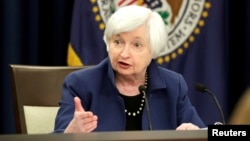Top officials of the U.S. central bank are gathered in Washington, debating how soon and how much to raise short-term interest rates, with a formal decision expected Wednesday.
PNC Bank Chief Economist Gus Faucher tells VOA that a healthy labor market and some wage growth make it a near certainty that the Federal Reserve will raise interest rates at the conclusion of its meeting Wednesday. Most economists expect the Fed will boost the benchmark rate a modest quarter of a percent, to a range between 1 and 1.25 percent. Faucher says the Fed is trying to slow consumer spending slightly.
The Fed cut rates nearly to zero at the worst of the financial crisis to make borrowing cheaper in a bid to boost economic growth and employment. Since then, the recovering economy and improved unemployment rate, at 4.3 percent, have prompted the central bank to gradually raise rates.
In a note to journalists, Moody's Investor Service says the Fed will continue to raise rates gradually this year and next. Moody's says so far, the slow and predictable rise in interest rates has avoided shaking up financial markets.
Officials worry that keeping rates too low for too long could spark a burst of inflation that could hurt the economy. The Fed's job is to keep prices stable and encourage full employment. However, Tuesday's newest data on inflation at the wholesale level shows little change. Fed officials have been trying to get inflation to rise to a low, but manageable, rate of about 2 percent.
Federal Reserve Chair Janet Yellen is scheduled to meet with journalists Wednesday afternoon, where she is likely to be asked about possible future interest rate hikes. She may also explain more about the Fed's plans to gradually sell off the huge number of securities that the central bank bought during the financial crisis in a complex effort to stimulate the economy.
Meanwhile, officials will get new information on changes in consumer prices and retail sales before they make their decision on interest rates. Investors watch retail sales closely because consumer demand drives most U.S. economic activity.







